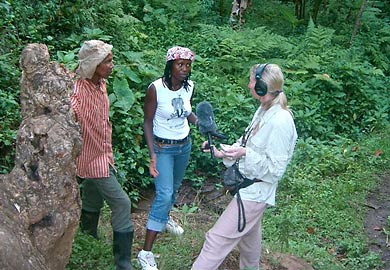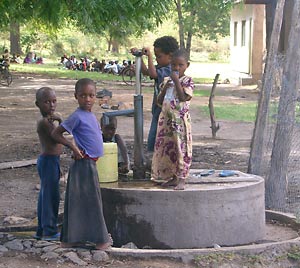UC Berkeley Web Feature
 |
Working with a Tanzanian translator, Kate Cheney Davidson (right) interviews a farmer about declining water sources near his home in Kifuru Juu, on the southern slopes of Mt. Kilimanjaro. (Jori Lewis photos) |
Front lines of global warming: Student recounts Mt. Kilimanjaro experiences
BERKELEY — Kate Cheney Davidson, a student in UC Berkeley's Graduate School of Journalism, recently learned firsthand that people living in farming communities on Mt. Kilimanjaro are already feeling the negative consequences of a changing climate.
Rising nearly 20,000 feet in the northeast corner of Tanzania, Kilimanjaro is the highest point on the African continent. Scientists who have been studying its famous cap of glaciers predict it will disappear in the next 10 to 15 years due, in part, to declining precipitation. The big question now is what will happen to the mountain’s water once the glaciers are gone.
 Children gather around the only remaining water pump in their village of Kahe, on the plain formed by the Pare Mountains, Mt. Kilimanjaro and Mt. Meru. |
"I chose to cover this story because I felt like there was very little being said in the media about the perceptions and experiences of ordinary people living on the mountain," said Davidson, one of 11 UC Berkeley journalism students who traveled abroad in early January to investigate global warming. "Yet, these are the people who have the most to lose as a result of climate change."
The journalism students' reports will be published at salon.com and on National Public Radio. Davidson said she conducted more than a dozen interviews with local farmers and residents who are among the millions of people who depend on the water that drains from Mt. Kilimanjaro and nearby Mt. Meru.
"They've experienced three years of severe drought already, and the short rains, which were supposed to come October through December, were a no-show again this year," Davidson said. "Crops are dying, especially in the lower elevations, and people are being forced in greater numbers into the forests to fell trees so they can exchange charcoal for food in the market."
Some farmers told Davidson that without rain, they can't water their crops, while others said that fights have broken out in certain areas over the right to traditional water sources.
Davidson heard about other changes, too.
"One older man told me about how all the houses in Mweka used to have fireplaces, but now they are never used," she said. "They used to wear sweaters and long sleeves, but now wear only short sleeves because it’s so warm."
Davidson described Kahe, a small village that lies in the shadow of Mt. Kilimanjaro, as a place marked by withered corn stalks, dusty roads and residents left wondering if the rains will ever return.

